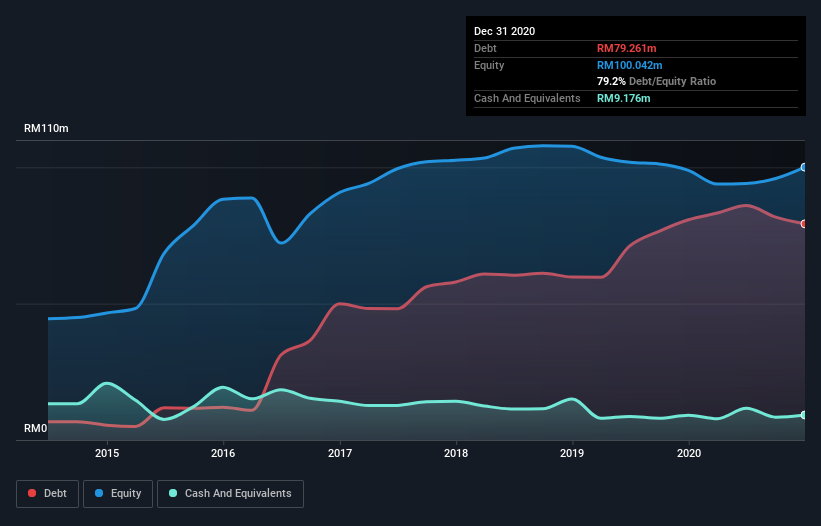Is GE-Shen Corporation Berhad (KLSE:GESHEN) Using Too Much Debt?

Howard Marks put it nicely when he said that, rather than worrying about share price volatility, 'The possibility of permanent loss is the risk I worry about... and every practical investor I know worries about.' It's only natural to consider a company's balance sheet when you examine how risky it is, since debt is often involved when a business collapses. We can see that GE-Shen Corporation Berhad (KLSE:GESHEN) does use debt in its business. But the more important question is: how much risk is that debt creating?
Why Does Debt Bring Risk?
Debt and other liabilities become risky for a business when it cannot easily fulfill those obligations, either with free cash flow or by raising capital at an attractive price. Part and parcel of capitalism is the process of 'creative destruction' where failed businesses are mercilessly liquidated by their bankers. However, a more frequent (but still costly) occurrence is where a company must issue shares at bargain-basement prices, permanently diluting shareholders, just to shore up its balance sheet. Of course, plenty of companies use debt to fund growth, without any negative consequences. The first thing to do when considering how much debt a business uses is to look at its cash and debt together.
Check out our latest analysis for GE-Shen Corporation Berhad
How Much Debt Does GE-Shen Corporation Berhad Carry?
The chart below, which you can click on for greater detail, shows that GE-Shen Corporation Berhad had RM79.3m in debt in December 2020; about the same as the year before. However, because it has a cash reserve of RM9.18m, its net debt is less, at about RM70.1m.

How Healthy Is GE-Shen Corporation Berhad's Balance Sheet?
According to the last reported balance sheet, GE-Shen Corporation Berhad had liabilities of RM100.4m due within 12 months, and liabilities of RM52.2m due beyond 12 months. Offsetting these obligations, it had cash of RM9.18m as well as receivables valued at RM46.6m due within 12 months. So it has liabilities totalling RM96.8m more than its cash and near-term receivables, combined.
This deficit is considerable relative to its market capitalization of RM161.1m, so it does suggest shareholders should keep an eye on GE-Shen Corporation Berhad's use of debt. Should its lenders demand that it shore up the balance sheet, shareholders would likely face severe dilution.
In order to size up a company's debt relative to its earnings, we calculate its net debt divided by its earnings before interest, tax, depreciation, and amortization (EBITDA) and its earnings before interest and tax (EBIT) divided by its interest expense (its interest cover). The advantage of this approach is that we take into account both the absolute quantum of debt (with net debt to EBITDA) and the actual interest expenses associated with that debt (with its interest cover ratio).
While GE-Shen Corporation Berhad's debt to EBITDA ratio (4.6) suggests that it uses some debt, its interest cover is very weak, at 1.4, suggesting high leverage. In large part that's due to the company's significant depreciation and amortisation charges, which arguably mean its EBITDA is a very generous measure of earnings, and its debt may be more of a burden than it first appears. So shareholders should probably be aware that interest expenses appear to have really impacted the business lately. One redeeming factor for GE-Shen Corporation Berhad is that it turned last year's EBIT loss into a gain of RM7.1m, over the last twelve months. The balance sheet is clearly the area to focus on when you are analysing debt. But you can't view debt in total isolation; since GE-Shen Corporation Berhad will need earnings to service that debt. So if you're keen to discover more about its earnings, it might be worth checking out this graph of its long term earnings trend.
But our final consideration is also important, because a company cannot pay debt with paper profits; it needs cold hard cash. So it is important to check how much of its earnings before interest and tax (EBIT) converts to actual free cash flow. Over the last year, GE-Shen Corporation Berhad actually produced more free cash flow than EBIT. That sort of strong cash generation warms our hearts like a puppy in a bumblebee suit.
Our View
Neither GE-Shen Corporation Berhad's ability to cover its interest expense with its EBIT nor its net debt to EBITDA gave us confidence in its ability to take on more debt. But the good news is it seems to be able to convert EBIT to free cash flow with ease. We think that GE-Shen Corporation Berhad's debt does make it a bit risky, after considering the aforementioned data points together. That's not necessarily a bad thing, since leverage can boost returns on equity, but it is something to be aware of. There's no doubt that we learn most about debt from the balance sheet. But ultimately, every company can contain risks that exist outside of the balance sheet. Be aware that GE-Shen Corporation Berhad is showing 4 warning signs in our investment analysis , and 2 of those are significant...
When all is said and done, sometimes its easier to focus on companies that don't even need debt. Readers can access a list of growth stocks with zero net debt 100% free, right now.
When trading stocks or any other investment, use the platform considered by many to be the Professional's Gateway to the Worlds Market, Interactive Brokers. You get the lowest-cost* trading on stocks, options, futures, forex, bonds and funds worldwide from a single integrated account. Promoted
New: Manage All Your Stock Portfolios in One Place
We've created the ultimate portfolio companion for stock investors, and it's free.
• Connect an unlimited number of Portfolios and see your total in one currency
• Be alerted to new Warning Signs or Risks via email or mobile
• Track the Fair Value of your stocks
This article by Simply Wall St is general in nature. It does not constitute a recommendation to buy or sell any stock, and does not take account of your objectives, or your financial situation. We aim to bring you long-term focused analysis driven by fundamental data. Note that our analysis may not factor in the latest price-sensitive company announcements or qualitative material. Simply Wall St has no position in any stocks mentioned.
*Interactive Brokers Rated Lowest Cost Broker by StockBrokers.com Annual Online Review 2020
Have feedback on this article? Concerned about the content? Get in touch with us directly. Alternatively, email editorial-team (at) simplywallst.com.
About KLSE:GESHEN
GE-Shen Corporation Berhad
An investment holding company, primarily engages in the manufacture and trading business in Malaysia, Singapore, and Vietnam.
Proven track record with adequate balance sheet.
Market Insights
Community Narratives



